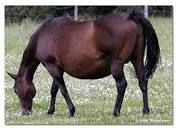It’s placentitis time of year again
The objective was to determine if long-term treatment with trimethoprim sulfamethoxazole (antimicrobial), pentoxifylline (anti-inflammatory/anti-cytokine) and altrenogest (synthetic progestin), would improve pregnancy outcome in mares with experimentally induced placentitis. Seventeen normal, pregnant pony mares were enrolled in the study at 280-295 d of pregnancy. Placentitis was induced in all mares by intra-cervical inoculation of Streptococcus equi subsp. zooepidemicus (10(7) CFU). Five mares served as infected, untreated control animals (Group UNTREAT). Twelve mares (Group TREAT) were infected and given trimethoprim sulfamethoxazole (30 mg/kg, PO, q 12h), pentoxifylline (8.5 mg/kg, PO, q 12h) and altrenogest (0.088 mg/kg, PO, q 24h) from the onset of clinical signs to delivery of a live foal or abortion. Blood samples were cultured from all foals at delivery and fetal stomach and thoracic contents were obtained for culture from dead fetuses. More mares in Group TREAT delivered viable foals (10/12; 83%; P < 0.05) than mares in Group UNTREAT (0/5; 0%). Ten of 12 foals (83%) in Group TREAT had negative blood cultures at birth. All foals in Group UNTREAT (5/5; 100%) had positive cultures from one or more samples (blood, stomach contents, and thoracic fluid). Bacteria were recovered from uterine culture samples in both groups. Streptococcus equi subsp. zooepidemicus was the predominant organism recovered from fetal/foal or mare culture samples. The authors inferred that administration of trimethoprim sulfamethoxazole, pentoxifylline and altrenogest may improve the viability of foals from mares with experimentally induced placentitis.
Click here for a detailed review including a paper on the treatment efficacy of combination therapy with trimethoprim sulfamethoxazole, pentoxifylline and altrenogest in experimentally induces equine plancentitis.

